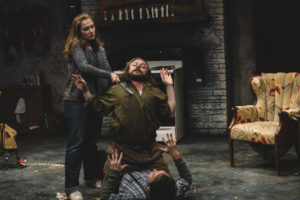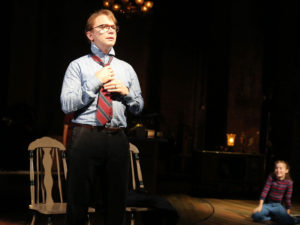 “Hatred was the word which had presented itself, and it had shaken him, for he knew that hatred was a horrible emotion, a compound of envy and fear.”
“Hatred was the word which had presented itself, and it had shaken him, for he knew that hatred was a horrible emotion, a compound of envy and fear.”
William Haggard, Slow Burner
Terry Teachout on the arts in New York City
In today’s Wall Street Journal drama column I review a revival of Martin McDonagh’s The Lonesome West in Washington, D.C. Here’s an excerpt.
* * *
Now that Brian Friel has left us, who is Ireland’s leading living playwright? Most American playgoers would likely declare the race to be a tossup between Conor McPherson and Martin McDonagh, who was born and raised in London but is still as Irish as a shot of Jameson. For my part, I always choose the one whose work I saw most recently, so this week’s prize goes to Mr. McDonagh, author of “The Lonesome West,” which has just been uproariously revived by Washington’s Keegan Theatre….
 First performed in 1997, “The Lonesome West” is the third panel in a triptych of plays (it was preceded by “The Beauty Queen of Leenane” and “A Skull in Connemara”) that are set in Leenane, a village in West Ireland. The title is drawn from “The Playboy of the Western World,” in which John Millington Synge tells the tale of a young man who claims to have killed his father and is fêted for it. Something like that happens in “The Lonesome West,” and it’s played, as is Mr. McDonagh’s wont, for anarchic laughter. But the joke is on Ireland, which he portrays as a violent, desperate land full of frustrated men and women who feed on embroidered memories and long-cherished grudges. Here as in the rest of his work, Mr. McDonagh savages the stage-Irish sentimentality that is the curse of his heritage, and the results are as exhilarating as a hard, cold wind….
First performed in 1997, “The Lonesome West” is the third panel in a triptych of plays (it was preceded by “The Beauty Queen of Leenane” and “A Skull in Connemara”) that are set in Leenane, a village in West Ireland. The title is drawn from “The Playboy of the Western World,” in which John Millington Synge tells the tale of a young man who claims to have killed his father and is fêted for it. Something like that happens in “The Lonesome West,” and it’s played, as is Mr. McDonagh’s wont, for anarchic laughter. But the joke is on Ireland, which he portrays as a violent, desperate land full of frustrated men and women who feed on embroidered memories and long-cherished grudges. Here as in the rest of his work, Mr. McDonagh savages the stage-Irish sentimentality that is the curse of his heritage, and the results are as exhilarating as a hard, cold wind….
“The Lonesome West” was first seen in the U.S. when Galway’s Druid Theatre Company brought the original production, staged by Garry Hynes, to Broadway in 1999. I missed it then (it ran for only 55 performances) and wish I hadn’t. Ms. Hynes’ Druid Theatre production of “The Cripple of Inishmaan,” which made it to New York’s Atlantic Theatre in 2008, proved that she has a profound understanding of Mr. McDonagh’s work. But this production, directed by Mark A. Rhea, the Keegan’s founder, leaves nothing whatsoever to be desired. It’s serious when it needs to be and funny the rest of the time…
* * *
Read the whole thing here.
 Seamus Heaney reads an excerpt from The Cure at Troy, his 1990 English-language adaptation of Sophocles’ Philoctetes, on The Andrew Marr Show, originally telecast by the BBC on March 16, 2008:
Seamus Heaney reads an excerpt from The Cure at Troy, his 1990 English-language adaptation of Sophocles’ Philoctetes, on The Andrew Marr Show, originally telecast by the BBC on March 16, 2008:
(This is the latest in a series of arts-related videos that appear in this space each Monday, Wednesday, and Friday)
In today’s Wall Street Journal “Sightings” column, I discuss the published version of Harry Potter and the Cursed Child and the problem of reading a play you haven’t seen. Here’s an excerpt.
* * *
What does it mean to call a book a “best seller”? According to Publisher’s Weekly, you have to sell 328 copies a day to crack Amazon’s top-five fiction list. So consider this: “Harry Potter and the Cursed Child” was published on July 31. By Aug. 2, it had sold two million copies.
So far, most of those two million readers appear to be perfectly happy with the new Harry Potter book. But the reviews posted on Amazon suggest that a fair number of them are sorely disappointed. Nearly a quarter of the reviewers gave the book a rock-bottom one-star rating. Some were vexed because J.K. Rowling didn’t write it, a fact that is noted on the cover, though you have to look twice to see it. In addition, though, many people seem to have been surprised to learn that “Harry Potter and the Cursed Child” is not a novel by Ms. Rowling but a play by Jack Thorne. (For the record, it opened in London two weeks ago to rave reviews.)
 Meaning what? Well, here’s how “HPATCC” starts out: “ACT ONE, SCENE ONE. KING’S CROSS. A busy and crowded station. Full of people trying to go somewhere. Amongst the hustle and bustle, two large cages rattle on top of two laden trolleys. They’re being pushed by two boys, JAMES POTTER and ALBUS POTTER, their mother, GINNY, follows after. A 37-year-old man, HARRY, has his daughter, LILY, on his shoulders.” At that point, the characters start talking and the play gets under way.
Meaning what? Well, here’s how “HPATCC” starts out: “ACT ONE, SCENE ONE. KING’S CROSS. A busy and crowded station. Full of people trying to go somewhere. Amongst the hustle and bustle, two large cages rattle on top of two laden trolleys. They’re being pushed by two boys, JAMES POTTER and ALBUS POTTER, their mother, GINNY, follows after. A 37-year-old man, HARRY, has his daughter, LILY, on his shoulders.” At that point, the characters start talking and the play gets under way.
Compare this with the opening of “Harry Potter and the Sorcerer’s Stone,” the first Potter novel: “Mr. and Mrs. Dursley, of number four, Privet Drive, were proud to say that they were perfectly normal, thank you very much. They were the last people you’d expect to be involved in anything strange or mysterious, because they just didn’t hold with such nonsense.” This is followed by three full pages of richly detailed description. Only then do the characters start talking.
Therein lies the problem: Unlike a novel, the script of a play is a set of instructions for creating a theatrical experience, not the experience itself. If you read a script after you’ve seen the play, you’ll remember what you saw, and the action will make sense to you. If not, you’ll have to “stage” the play for yourself in your mind’s eye. Unless you’re a theatrical professional or a seasoned playgoer, you’re likely to find that difficult to do….
* * *
Read the whole thing here.
Here’s my list of recommended Broadway, off-Broadway, and out-of-town shows, updated weekly. In all cases, I gave these shows favorable reviews (if sometimes qualifiedly so) in The Wall Street Journal when they opened. For more information, click on the title.
BROADWAY:
• An American in Paris (musical, G, too complex for small children, closes Jan. 1, reviewed here)
• The Color Purple (musical, PG-13, nearly all performances sold out last week, reviewed here)
 • Fun Home (serious musical, PG-13, closes Sept. 10, reviewed here)
• Fun Home (serious musical, PG-13, closes Sept. 10, reviewed here)
• Hamilton (musical, PG-13, Broadway transfer of off-Broadway production, all performances sold out last week, reviewed here)
• Matilda (musical, G, closes Jan. 1, nearly all performances sold out last week, reviewed here)
• Les Misérables (musical, G, too long and complicated for young children, closes Sept. 4, virtually all performances sold out last week, reviewed here)
• On Your Feet! (jukebox musical, G, reviewed here)
OFF BROADWAY:
• The Fantasticks (musical, G, suitable for children capable of enjoying a love story, reviewed here)
• Sense & Sensibility (serious romantic comedy, G, remounting of 2014 off-Broadway production, extended through Nov. 20, original production reviewed here)
IN EAST HADDAM, CONN.:
• Bye Bye Birdie (musical, G, closes Sept. 8, reviewed here)
CLOSING SOON IN GARRISON, N.Y.:
• Measure for Measure (Shakespeare, PG-13, closes Aug. 28, reviewed here)
CLOSING SATURDAY IN PITTSFIELD, MASS.:
• The Pirates of Penzance (operetta, G, reviewed here)
 “All the inducements of early society tend to foster immediate action, all its penalties fall on the man who pauses; the traditional wisdom of those times was never weary of inculcating that ‘delays are dangerous,’ and that the sluggish man—the man ‘who roasteth not that which he took in hunting’—will not prosper on the earth, and indeed will very soon perish out of it: and in consequence an inability to stay quiet, an irritable desire to act directly, is one of the conspicuous failings of mankind.”
“All the inducements of early society tend to foster immediate action, all its penalties fall on the man who pauses; the traditional wisdom of those times was never weary of inculcating that ‘delays are dangerous,’ and that the sluggish man—the man ‘who roasteth not that which he took in hunting’—will not prosper on the earth, and indeed will very soon perish out of it: and in consequence an inability to stay quiet, an irritable desire to act directly, is one of the conspicuous failings of mankind.”
Walter Bagehot, Physics and Politics
| M | T | W | T | F | S | S |
|---|---|---|---|---|---|---|
| 1 | 2 | 3 | 4 | 5 | 6 | |
| 7 | 8 | 9 | 10 | 11 | 12 | 13 |
| 14 | 15 | 16 | 17 | 18 | 19 | 20 |
| 21 | 22 | 23 | 24 | 25 | 26 | 27 |
| 28 | 29 | 30 | ||||
An ArtsJournal Blog